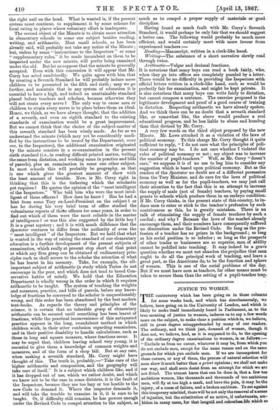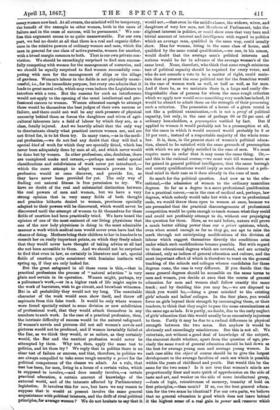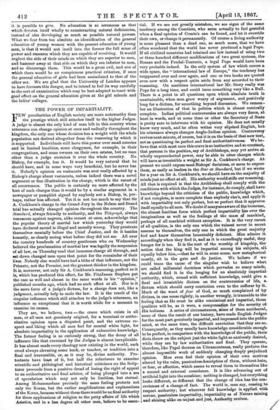JUSTICE TO WOMEN.
THE controversy which has been going on in these columns
for some weeks back, and which has simultaneously, we believe, been going on in.the University of London, and. which is likely to make itself immediately heard in Parliament, aa to the true meaning of justice to women, induces us to say a few words more on the subject, to make clear a position which is, we believe, still in great degree misapprehended by many of our readers. The ordinary, and we think just, demand of women, though it does not, we believe, lead, as it is supposed to do, to the opening of the ordinary degree examinations to women, is as follows :— " Exclude us from no career, whatever it may be, from. which you do not exclude men, except for the same reason and on the same grounds for which you exclude men. If we are incompetent for these careers, or any of them, the process of natural selection will soon show it much better than a priori opinions; we shall not make our way, and shall soon desist from an attempt for which we are not fitted. The utmost harm that can be done is, that a few too ambitious women, like thousands and thousands of too ambitious men, will fly at too high a mark, and have the pain, it may be the injury, of a sense of failure, and a broken ambition. To set against this temporary mischief, there will be not only the removal of a sense of injustice, but the substitution of an active,, if unfortunate, am- bition in many cases, for that languid and colon:1°41,We which so
many women now lead. At all events, the mischief will be temporary, the benefit of the example to other women, both in the cases of failure and, in the cases of success, will be permanent." We con- fess this argument seems to us quite unanswerable. For our own part, we feel no doubt at all that there is a real and organic differ- ence in the relative powers of ordinary women and men, which fits men in general for one class of active pursuits, women for another, with a broad margin common to both. That is our own private con- viction. We should be exceedingly surprised to find men success- fully competing with women for the management of nurseries., and we should be equally surprised to find women successfully com- peting with men for the management of ships or the tillage of gardens. Women's labour in the fields is not physically unsuc- cessful, i.e., for its immediate purpose, but every one admits that it leads to great moral evils, which may even induce the Legislature to interfere with a veto. But the reasons for such an interference would not apply to the opening of the usual intellectual and pro- fessional careers to women. Women educated enough to attempt these would be themselves the best judges of their own success or failure, and there could not well be any such pressure of physical necessity behind them as forces the daughters and wives of agri- cultural labourers into a field of labour by which they are, as a class, fatally injured. And we heartily admit that the only way to discriminate clearly what practical careers women are, and are not fitted for, is to let them try. In many cases, —as in the medi- cal profession,—we do not feel any doubt that they will find a special kind of work for which they are specially fitted, which has never been adequately done by men at all, and which never would be done but by women. In other professions, also, doubtless, there are unexplored nooks and corners,—perhaps most useful special classifications and subdivisions of work never yet introduced,— which the mere attempt to adapt women's powers to the profession would at once discover, and provide for, as they have never been provided for yet. The only way of finding out natural fitness is free permission to try. We have no doubt of the real and substantial distinction between the real powers of men and women, but we have a very strong opinion that in very many fields of both thought and practice hitherto denied to women, provinces specially adapted to their powers will be discovered, which would never, be discovered until the attempt of women to fit themselves for these fields of exertion had been practically tried. We have heard the opinion of one of the most eminent of our living physicians that -one of the new lady physicians is doing in the most admirable manner a work which medical men would never even have had the chance of doing. Mothers bring their children to her in hundreds to consult her on really important points, on which they freely admit that they would never have thought of taking advice at all had she not been accessible to them. And we should not be surprised to find that even in law, as certainly in literature and art, special fields of exertion quite consistent with feminine instincts will spring up, if they are only looked for.
But the great safeguard in all these cases is this,—that in practical professions the process of "natural selection" is very plain and certain in its operation. Women might, perhaps, try a policeman's work,—or in a higher rank of life might aspire to the work of barristers, wish to go circuit, and browbeat witnesses. Bat in all probability they would not try long. The unsuitable character of the work would soon show itself, and throw off aspirants from this false track. It would be only where women were found specially suited to some division or new subdivision of professional work, that they would attach themselves in any numbers to such work. In the case of a practical profession, then, the intrinsic difficulty of success would be the natural safeguard. if women's novels and pictures did not sell women's novels and pictures would not be produced, and if women invariably failed at the Bar, as we think they would, or as sailors, as they certainly would, the BSI' and the nautical profession would never be attempted by them. Why not, then, apply the same test to politics, and let them try? We reply that in politics there is no clear test of failure or success, and that, therefore, in politics we are always compelled to take some rough security a priori for the political competence of the classes we admit. As a rule, that test has been, for men, living in a house of a certain value, which is supposed to involve,—and does usually involve,—a certain practical education, a certain amount of knowledge of the external world, and of the interests affected by Parliamentary legislation. It involves this for men, but have we any reason to suppose that it would at present involve the same general acquaintance with political interests, and the drift of rival political principles, for average women ? We do not hesitate to say that it
would not,—that even in the middle classes, the widows, wives, and daughters of very few men, not Members of Parliament, take the slightest interest in politics, or could show even that very bare and trivial amount of interest and intelligence with regard to politics which an average man, qualified in the same way, could usually show. Man for woman, living in the same class of house, and. qualified by the same rental qualification,—no one, in his senses, would doubt that the average man's political interests and notions would be far in advance of the average woman's of the same level. None, therefore, who think that some rough minimum test of political capacity should be required for every voter, and who do not concede a vote to be a matter of right, could main- tain that at present the same political test for the franchise would in the case of women work as well, or half as well, as for men. And if there be, as we maintain there is, a large and easily dis- tinguishable class of persons for whom the same rough criterion which we apply now would mean something very much less indeed, it would be absurd to admit them on the strength of their possessing such a criterion. The possession of a house of a given rental is not like a political examination,—it is not a proof of political capacity, but only, in the case of perhaps 60 or 70 per cent. of
ordinary householders, a presumption verified by fact. But if applied to women it would probably not be a presumption at all, for the cases in which it would succeed would probably be 9 or 10 per cent., instead of a respectable majority of the whole num- ber. It is, then, in the present state of women's political educa- tion, absurd to be satisfied with the same grounds of presumption with which we are rightly satisfied in the case of men. We must require more in order that it may mean the same thing. Or,— and this is the rational course,—we must wait till women have -so far gained in general political intelligence, that the same borough and county qualifications would imply as much chance of a poli- tical mind in their case as it does already in the case of men.
So much for the political question. And now as to the edu- cational,—the admission of women to the ordinary masculine degrees. So far as a degree is a mere professional qualification for a practical career,—as in the case of medical and, perhaps, law degrees, which nobody would take but with a view to professional ends, we would throw them open to women at once, because we are persuaded that the practical discouragements of professional competition would be quite enough to teach women what they could and could not profitably attempt to do, without our prejudging the question for them. Here, as we said before, nature will prove a much better sifting power than our a priori opinions, which, even when sound enough as far as they go, are apt to miss the mark through not anticipating modifications of the division of labour which suggest themselves directly the conditions arise under which such modifications become possible. But with regard to those educational degrees which are coveted, and are actually obtained, only as indices of general education and culture, and the most important effect of which is therefore to read on the general teaching of the schools and colleges whence candidates for these degrees come, the case is very different. If you decide that the same general degrees should be accessible on the same terms to men and women, you decide at once that the course of general education for men and women shall follow exactly the same track ; and by deciding this you may be,—wo are disposed to think you would be,—doing a great mischief to the existing girls' schools and ladies' colleges. In the first place, you would force on girls beyond their strength by encouraging them, or their teachers, to think that they ought top the same examinations at the same age as lads. It is partly, no doubt, due to the early neglect of girls' education that this would usually be so excessively injurious to them. Partly it may be due to a radical difference in physical strength between the two sexes. But anyhow it would be obviously and exceedingly mischievous. But this is not all. We entertain, not without a good deal of knowledge of the subject, the sincerest doubt whether, apart from the question of age, pre- cisely the same track of general education should be laid down as the best for average young men and average young women. In each case alike the object of course should be to give the largest development to the average faculties of each sex which is possible within the years of childhood and youth. But would this be the same for the two sexes ? Is it not true that women's minds are proportionally finer and more quick of apprehension on the side of taste and art, and weaker on the side of mere intellectual grasp, —feats of logic, retentiveness of memory, tenacity of hold on first principles,—than men's? If so, can the best general educa- tion for the two sexes be identical? For our own parts, we believe that no general education is good which does not leave behind it the highest acme of a real gain in power and ream= which it is possible to give. No education is so erroneous as that which devotes itself wholly to counteracting natural deficiencies, instead of also developing as much as possible natural powers. What we fear from too absolute an identification of the general education of young women with the present education of young men, is that it would not instil into the former the full sense of power and resource which they are capable of receiving. It would neglect the side of their minds on which they are superior to men, and hammer away at that side on which they are inferior to men, and so discourage them. This would be a great evil, and one of which there would be no conspicuous practical criterion, if once the general education of girls had been assimilated to that of the other sex. We are glad that the University of London appears to have foreseen this danger, and to intend to feel its way carefully to the sort of examination which may be best adapted to react with good effect on the general education given at the girl schools and the ladies' colleges.
































 Previous page
Previous page